When Leading Together: The Campaign for Washington University publicly launched in 2012, one of its goals was to raise $150 million for new scholarships and fellowships. That goal was quickly surpassed and raised to $330 million.
During Mark S. Wrighton’s tenure as chancellor, he has made it a priority that Washington University in St. Louis become more accessible and affordable for greater numbers of qualified students from a wide variety of backgrounds. In 2014, he announced the campaign’s goal for scholarships had been increased to at least $400 million to better support undergraduate and graduate students with financial need.
As Wrighton said at the time: “We aspire to admit talented students, independent of their financial circumstances, and to help them fulfill their potential as graduates of the university. To do so, we must increase the financial aid resources we have available so that all admitted students can afford to join us.”
Donors to Leading Together far exceeded the goal, contributing a record-breaking $591 million for scholarships and fellowships by the campaign’s end this summer. Here are some of the stellar students and recent alumni who have benefited from Washington University’s commitment to expanding opportunities for outstanding students from all socio-economic backgrounds to attend:
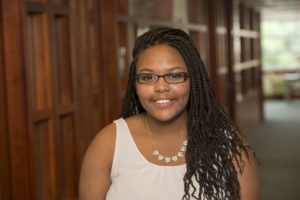
Mackenzie Hines-Wilson, sophomore in Arts & Sciences
Sophomore Mackenzie Hines-Wilson chose Washington University after participating in the College Prep Program, an innovative multiyear program for talented, low-income students from St. Louis-area high schools. For three summers, Hines-Wilson and her fellow scholars lived and learned on campus, earning college credit, drafting college essays and mastering skills such as time management.
During a farewell dinner in the summer of 2016, Provost Holden Thorp and Leah Merrifield, associate vice chancellor for community engagement and St. Louis college readiness initiatives, told the scholars and their families that Washington University had established the College Prep Scholarship for admitted graduates of the program.
“I will never forget that moment,” said Hines-Wilson, a student in Arts & Sciences and an Ervin Scholar. “I remember crying so hard. Coming from a single-parent household, that was so big for my family.”
Hines-Wilson is one of six College Prep Scholars from Cohort 1 to attend Washington University. This fall, 11 College Prep Scholars from Cohort 2 joined her.
So far, Hines-Wilson has taken courses in chemistry, neuroscience and biology, assisted in multiple psychological and brain sciences labs, and participated in Redefining Community Experience, a three-day social justice retreat. Hines-Wilson said the broad range of experiences in and outside of the classroom are preparing her for a career in psychiatry.
“I’ve had the opportunity to meet people from across campus with different backgrounds and identities,” Hines-Wilson said. “That matters to me because I want to support people and connect with people in ways that are meaningful. That’s why I want a career in mental health; I don’t want to be the type of doctor that fixes a physical problem and says goodbye. I want to build relationships and bonds. You can’t do that unless you try to understand what people have gone through.”
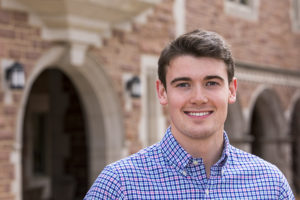
Peter Delaney, 2018 graduate
As an undergraduate, Delaney designed a sustainable emergency medicine curriculum in Uganda, a country with no ambulances. He launched a successful business that helps health-care startups raise capital and started work on a new software that may revolutionize hospital billing.
“To me, being an innovator isn’t about what you build; it’s about how you think,” said Delaney, who filed for his first patent in high school. “I try to bring an innovation mindset to everything I do.”
Delaney chose Washington University after earning the prestigious Moog Fellowship for Biological Sciences and Chemistry. He graduated in 2018 with a degree in global health and the environment from Arts & Sciences.
This summer, Delaney collaborated with an international research team to establish another first-responder system in Chad and is continuing work on his billing software. Soon he will apply to medical schools, including Washington University School of Medicine.
“This community has an innovation mindset,” Delaney said. “I like that.”
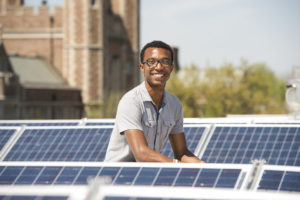
Deko Ricketts Devins, 2017 graduate
In high school, Deko Ricketts Devins assumed that a track scholarship to a Division 1 school would be his ticket to college. Then he visited Washington University.
“It was my dream school, but all I could see was the price tag,” said Devins, who grew up in Kansas City and graduated in 2017 with a degree in electrical engineering from the School of Engineering & Applied Science. “So I took a chance and applied early decision. I figured I wouldn’t get in or I would be in debt for the rest of my life. Then I saw my financial aid package. It changed my world.”
Devins was named an Enterprise Holdings Scholar. He went on to set the school record for the men’s 800 meters and, in 2018, was selected, along with goalkeeper Lizzy Crist, as an NCAA Today’s Top 10 Award winner, an honor bestowed on former college athletes who have succeeded on the field, in the classroom and in the community.
He also worked for the Office of Sustainability, launched two businesses and studied ways to address the global energy crisis. As a child, Devins occasionally went without electricity, so he knows no electricity means no air conditioning in a blazing-hot summer, no light for homework.
“That experience helped me understand the importance of energy in a way most people can’t comprehend,” Devins said.
Today, he continues his work as an engineer in St. Louis for Azimuth Energy, experts in renewable energy and energy efficiency.
“Give a community energy and you open so many doors,” Devins said.
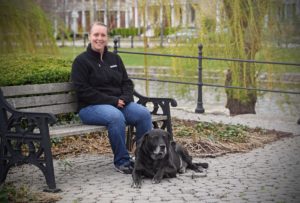
Angela Peacock, 2017 University College graduate; Brown School student
The U.S. Army taught Angela Peacock how to act quickly in a crisis. But Washington University taught Peacock how to understand the roots of the crisis, support those hurt by the crisis and prevent the next crisis from happening.
“These two experiences have shaped who I am and have prepared me to serve my community,” Peacock said.
Peacock is now in her second year in a master’s program at the Brown School thanks to a generous scholarship from a military social worker. She is studying veterans’ issues and, ultimately, wants to help veterans with post-traumatic stress disorder and other mental health disorders.
Peacock struggled after her service in Baghdad. It took a long time, but after extensive counseling and horse therapy, she finally felt ready for college. She enrolled in St. Charles Community College and transferred to University College in Arts & Sciences to study psychology. She immediately joined WUVets, the student veterans group.
Meanwhile, she excelled as a scholar. She was inducted into Phi Beta Kappa, the nation’s oldest and most prestigious liberal arts honor society, and was selected to serve as the University College student marshal at Commencement, an honor reserved for top student leaders.
At the Brown School, she is continuing to grow as a scholar and a leader. She recently was elected president of WUVets, where she is working to expand the group’s membership, outreach and programs.
“With anybody else, it takes months of getting to know each other,” Peacock said. “With veterans, just put us together and the magic happens.”
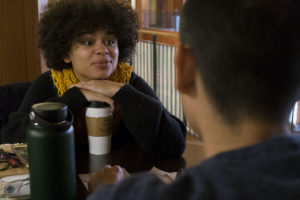
Ruth Durrell, junior in Arts & Sciences
Junior Ruth Durrell has a powerful message for fellow Pell grant-eligible students: “You are not here to struggle by yourself.”
Durrell is both an Enterprise Scholar and an Ervin Scholar. Last year, she volunteered to support the new Deneb STARS (Sustaining Talented Academically Recognized Students) program, where low-income students socialize and study together, learn leadership skills and support the next generation of students.
As a peer mentor, she acts as both coach and big sister to younger students, reminding them to visit professors during office hours, get enough sleep and ask for help when they need it.
“I tell my Denebs, ‘You need to take advantage of everything campus is going to give you because you are never going to have resources like this again,’” Durrell said. “I understand what they are going through. I feel that some students who are more affluent understand, ‘Hey, I paid for this; I deserve this help,’ versus a kid on scholarship from a public school who doesn’t want to feel like they are inconveniencing a professor.”
Durrell has noticed a change on campus — not just in the number of low-income students here but also the growing number of programs and policies that support their success.
“I can’t even explain what it’s like to have a community where you don’t have to explain why you can’t go out to dinner to a nice restaurant or go shopping,” Durrell said. “I’m very proud of my low-income, black, queer identity, and I remind my mentees they should be proud of who they are, too.”